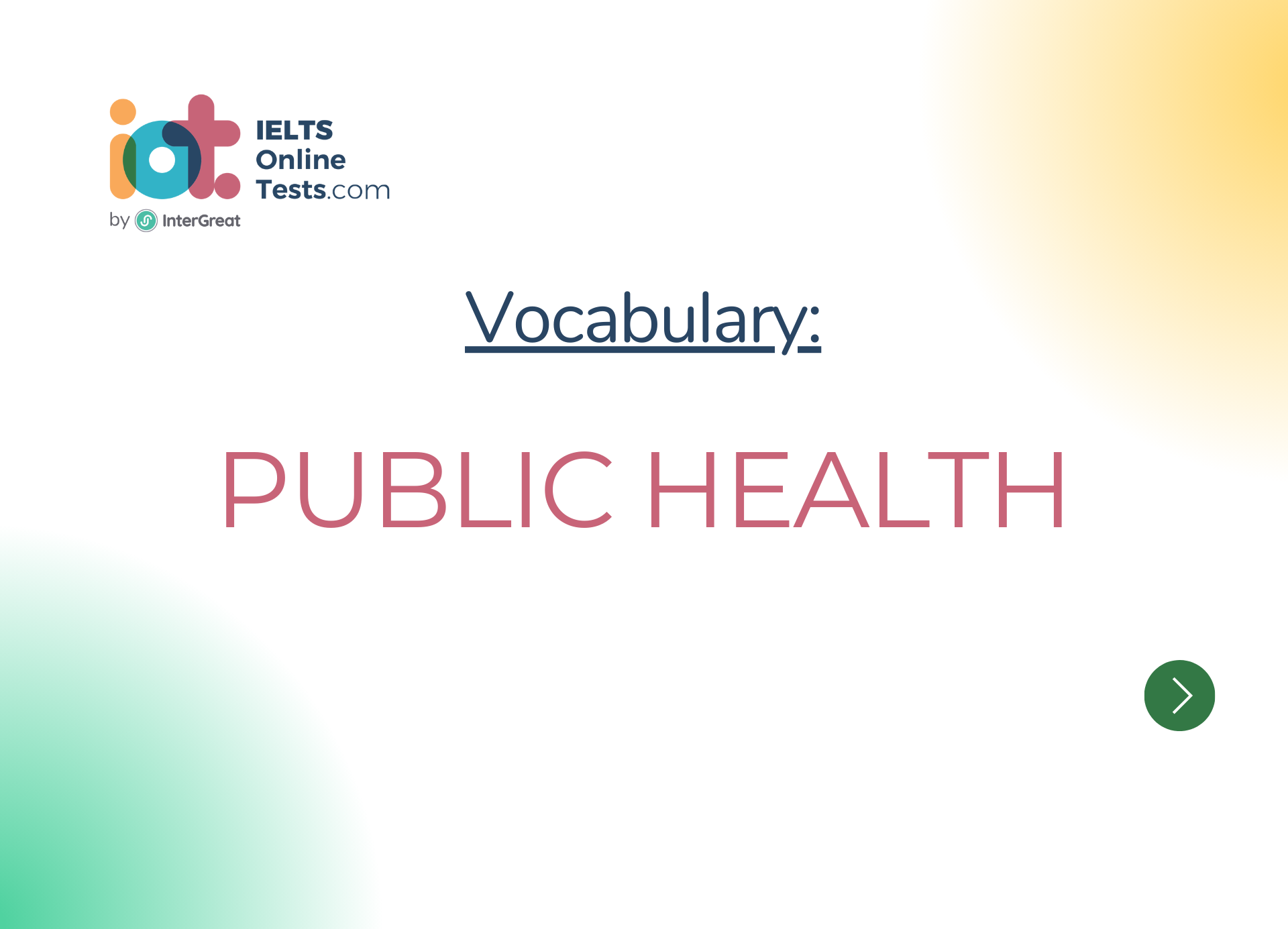
Public health
Below is a detailed list of vocabulary related to public health, along with their definitions. Understanding these terms will help you discuss various aspects of public health during the IELTS exam or any conversations related to health and well-being.
Epidemiology:
- Definition: The study of the distribution and determinants of health-related events and diseases in populations.
Outbreak:
- Definition: The sudden occurrence of a disease in a specific geographic area or population.
Pandemic:
- Definition: An outbreak of a disease that occurs over a wide geographic area and affects an exceptionally high proportion of the global population.
Incidence:
- Definition: The rate of new cases of a disease or health condition occurring in a population during a specific time period.
Prevalence:
- Definition: The total number of cases of a disease or health condition present in a population at a given time.
Endemic:
- Definition: The constant presence or usual prevalence of a disease in a specific geographic area or population.
Pathogen:
- Definition: A microorganism, such as a virus or bacterium, that can cause disease in a host.
Vector:
- Definition: An organism, often an insect or arthropod, that transmits pathogens from one host to another.
Zoonotic:
- Definition: A disease that can be transmitted from animals to humans.
Vaccination:
- Definition: The administration of a vaccine to stimulate the immune system and prevent specific diseases.
Herd Immunity:
- Definition: A level of immunity in a population that provides protection to unvaccinated individuals due to a decreased likelihood of disease transmission.
Health Promotion:
- Definition: The process of enabling individuals and communities to improve their health and well-being through education and empowerment.
Social Determinants of Health:
- Definition: The social, economic, and environmental factors that influence an individual's health status and access to healthcare.
Health Disparities:
- Definition: Differences in health outcomes between different groups of people, often associated with social or economic disadvantages.
Health Equity:
- Definition: The attainment of the highest level of health for all individuals, regardless of social, economic, or demographic factors.
Health Literacy:
- Definition: The ability of individuals to access, understand, and use health information to make informed decisions about their health.
Behavioral Risk Factors:
- Definition: Habits or actions that increase the likelihood of developing health problems, such as smoking, unhealthy diet, or lack of physical activity.
Chronic Disease:
- Definition: A long-lasting medical condition that generally progresses slowly and requires ongoing management and treatment.
Health Surveillance:
- Definition: The continuous monitoring and collection of health data to identify and respond to health threats and trends.
Health Policy:
- Definition: Decisions, plans, and actions undertaken to achieve specific health goals within a society.
Primary Prevention:
- Definition: Actions taken to prevent the occurrence of a disease or health condition before it happens.
Secondary Prevention:
- Definition: Actions taken to detect and treat a disease or health condition at an early stage to prevent further complications.
Tertiary Prevention:
- Definition: Actions taken to manage and improve the quality of life for individuals with chronic or long-term health conditions.
Quarantine:
- Definition: The isolation of individuals who have been exposed to a contagious disease to prevent its spread.
Contact Tracing:
- Definition: The process of identifying and monitoring individuals who have come into contact with an infected person to prevent further transmission of a disease.
Public Health Intervention:
- Definition: Strategies and measures implemented to improve public health and prevent disease, injury, and disability.
Environmental Health:
- Definition: The branch of public health that focuses on the relationship between people and their environment, including air and water quality, sanitation, and food safety.
Health Behavior:
- Definition: The actions and choices individuals make that impact their health and well-being.
Healthcare Access:
- Definition: The ability of individuals to obtain timely, affordable, and appropriate healthcare services.
Global Health:
- Definition: The study and practice of improving health and achieving equity in health for all people worldwide.
Please note that public health is a vast field with many concepts and aspects, and these terms provide a foundation for discussing and understanding different aspects of public health during the IELTS exam or any healthcare-related conversations.




